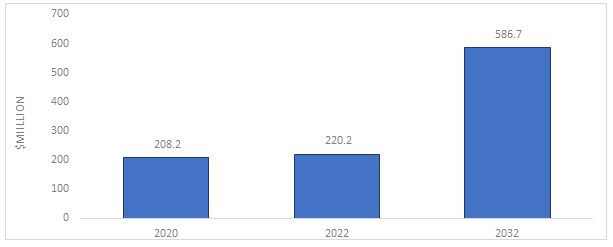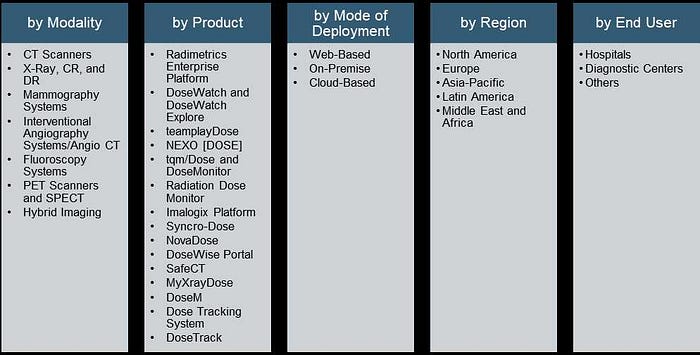Radiation dose is the amount of radiation absorbed by a patient during a diagnostic imaging procedure. A large dose of radiation can cause tissue damage and increase the risk of developing cancer in later stages of life.The development of on-cloud dose management solutions and the growing initiatives on radiation dose management for pediatric procedures are some of the major opportunities in the global radiation dose management market. Furthermore, some of the key trends going on in the market include the increasing development of imaging modalities with technologies that lower radiation dose, partnerships and strategic business alliances dominating the market, and various collaborations among market players.
The global radiation dose management market was valued at $212.8 million in 2021 and is anticipated to reach $586.7 million by 2032, witnessing a CAGR of 10.30% during the forecast period 2022–2032. The growth in the global radiation dose management market is expected to be driven by the rising prevalence of chronic disorders requiring diagnostic intervention, the growing focus on interventional radiology (IR), and the growing awareness surrounding patient safety and the harmful and biological effects of overexposure to ionizing radiation.

Impact of COVID-19
The decline in imaging volumes during the COVID-19 pandemic impacted the utilization of radiation diagnostic equipment. All radiology equipment had to be thoroughly disinfected using ethanol owing to the strict protocols to minimize the risk of transmission of COVID-19.
In the post-COVID-19 scenario, imaging volumes are expected to return gradually to pre-pandemic levels. As the severity of the COVID-19 pandemic declines, hospitals are expected to reallocate resources toward radiology and pursue diagnostic imaging with renewed vigor. Moreover, in the long term, radiology practices could be permanently redesigned as radiologists become more comfortable treating patients remotely. Furthermore, hospitals and other healthcare institutions are expected to be better equipped to deal with unprecedented events that may disrupt their businesses.
The COVID-19 pandemic placed high importance on automating tasks requiring manual intervention. While conventionally, data transfer and dose recording were done manually, the advent of advanced dose management software (DMS) has enabled automated data transfer from imaging systems into the DMS as well as automated dose recording. This helps eliminate human error and reduces the need for human intervention, which was a concept that gained momentum as a result of the COVID-19 pandemic.
Market Segmentation

Recent Developments in the Global Radiation Dose Management Market
• In December 2020, Bayer AG launched Radimetrics v3.0, the latest evolution of its enterprise dose management utility.
• In December 2020, FUJIFILM Holdings Corporation launched the unique SYNAPSE Dose 2.0 to provide a comprehensive system for managing patient radiation exposure across several imaging modalities.
• In January 2020, Agfa HealthCare collaborated with Maasstad Hospital in the Netherlands to support advancements in the consistency and optimization of radiation doses.
• In April 2019, Qaelum NV signed an agreement with TOYO Corporation to distribute its dose monitoring solution, DOSE, in Japan.
• In January 2019, SST Group, Inc. partnered with Intermountain Healthcare to implement a software platform for the Radiation Dose Monitor (RDM). The software platform permits medical professionals to manage, examine, and optimize the dose delivered to a patient during interventional procedures, medical imaging examinations, and image-guided surgery.
• In August 2018, Imalogix launched a newer version of its radiation dose management platform with additional fluoroscopy capabilities. The software solution can automatically calculate the peak skin dose for the patient during a fluoroscopic procedure.
• In August 2018, Guerbet LLC USA, a subsidiary of the Guerbet Group, partnered with Imalogix to decrease inconsistency and advance the quality, safety, and competence of care around radiation dose management, to enable the network health system and member facilities to monitor patient radiation dose on a per-procedure and cumulative basis.
• In March 2018, PACSHealth, LLC launched DoseMonitor, a radiation dose management software for tracking radiation dose absorption.
Demand — Drivers and Limitations
Following are the drivers for the global radiation dose management market:
• Increasing installed bases of radiology equipment and the number of scans lead to a higher risk of radiation exposure, thus creating demand for dose management solutions.
• The increasing prevalence of cardiovascular diseases and growing occupational hazards in cath labs lead to the growing concern surrounding the effects of radiation exposure.
• Growing focus on interventional radiology (IR) is expected to increase demand for IR imaging systems and subsequently lead to a higher risk of radiation exposure.
• Increasing concern related to radiation overexposure is leading to higher adoption of dose management solutions.
• Growing awareness and initiatives for radiation dose management are expected to push the adoption of dose management software.
• Advancements in dose optimization and benchmarking in various countries will encourage healthcare institutions to adopt dose management software.
The market is expected to face some limitations as well due to the following challenges:
• The lack of awareness among the population and the shortage of skilled and trained professionals leading to a steep learning curve hinders the adoption of dose management software.
• The lack of diagnostic reference levels (DRLs) for radiation dose benchmarking in low-income countries causes healthcare institutions to not pursue the adoption of dose management software with vigor.
Check out the detailed table of content here: — https://bisresearch.com/requestsample?id=1409type=toc
Key Market Players and Competition Synopsis
The companies that are profiled have been selected based on inputs gathered from primary experts and analyzing company coverage, product portfolio, and market penetration.
Some of the prominent names established in this market are:
• Agfa-Gevaert Group
• Bracco
• Bayer AG
• Canon Inc.
• FUJIFILM Holdings Corporation
• Guerbet
• General Electric Company
• Imalogix
• Infinitt Healthcare Co., Ltd.
• Koninklijke Philips N.V.
• LANDAUER
• Medic Vision Imaging Solutions Ltd.
• Medsquare
• MyXrayDose Ltd.
• Novarad Corporation
• PACSHealth, LLC
• Qaelum NV
• Sectra AB
• SST Group Inc.
• Siemens Healthineers AG
• Virtual Phantoms Inc.
Companies that are not a part of the previously mentioned pool have been well represented across different sections of the report (wherever applicable).
Get Free Sample Report — https://bisresearch.com/requestsample?id=1409type=download
The USP of this report
The following can be considered USPs of this report:
· Detailed impact of COVID-19 on the global radiation dose management market
· Gap analysis
· Price analysis
· Detailed segmentation based on product with in-depth information on each of the 15 dose management software
· Market share analysis of the major players done to offer a holistic view of the global radiation dose management market landscape
Who should buy this report?
The companies manufacturing and commercializing radiation dose management software for use in hospitals, diagnostic centers, research institutes, and ambulatory and specialty clinics should buy this report. Moreover, companies who are into dosimetry systems and looking to venture into software solutions for radiation dose management can also buy this report
Comments
Post a Comment